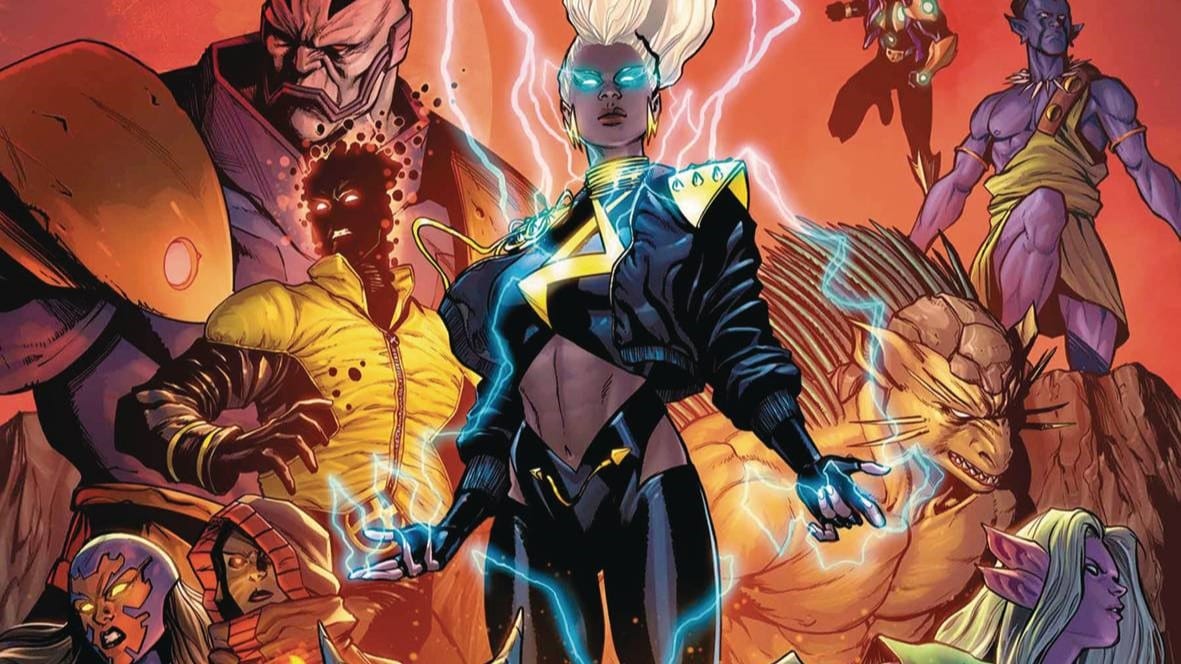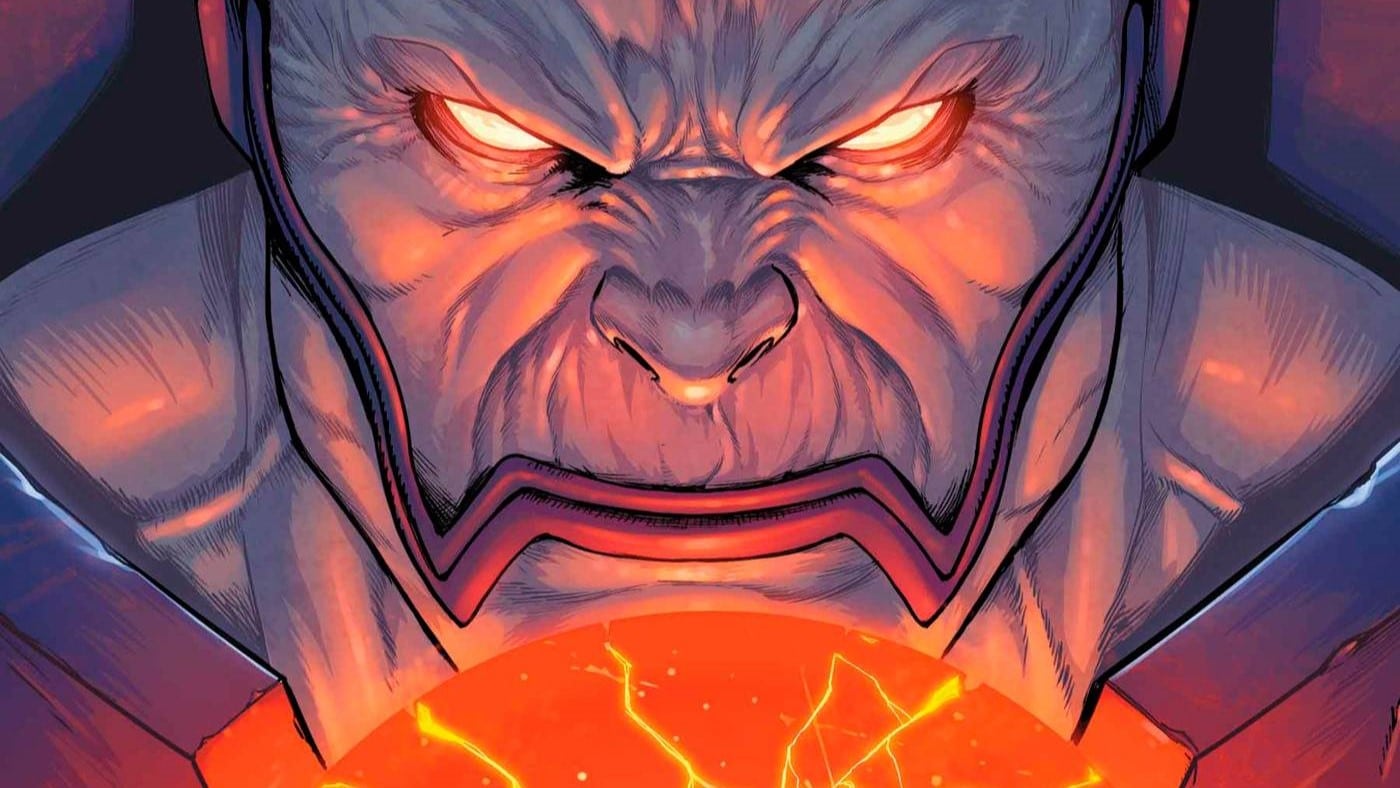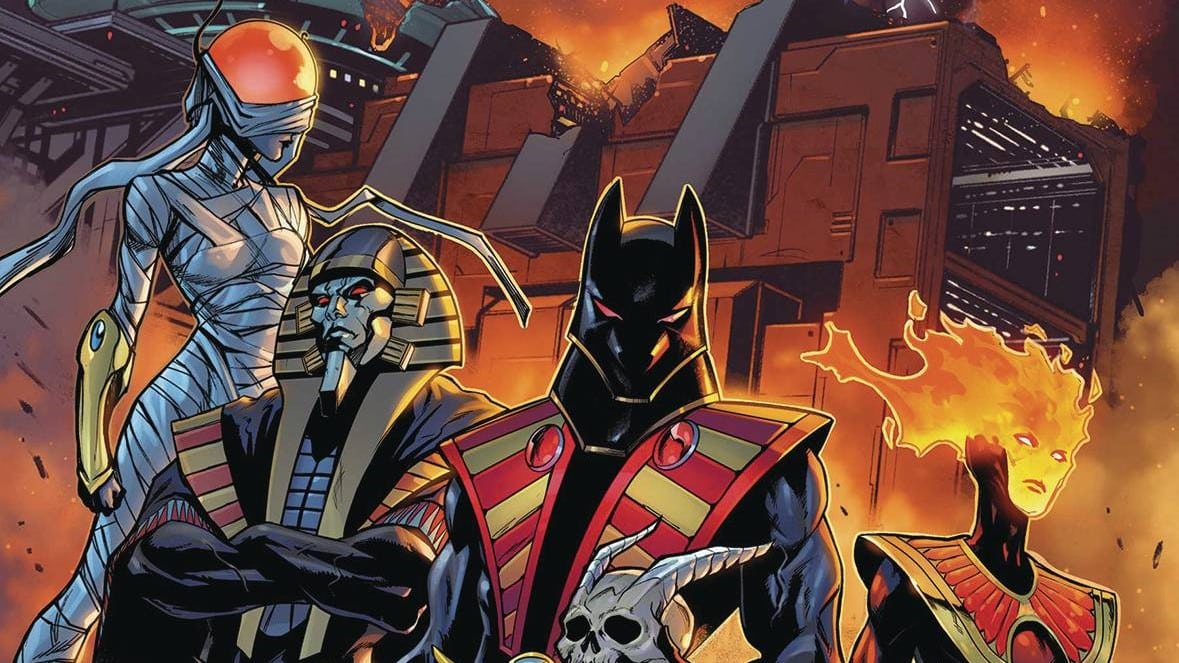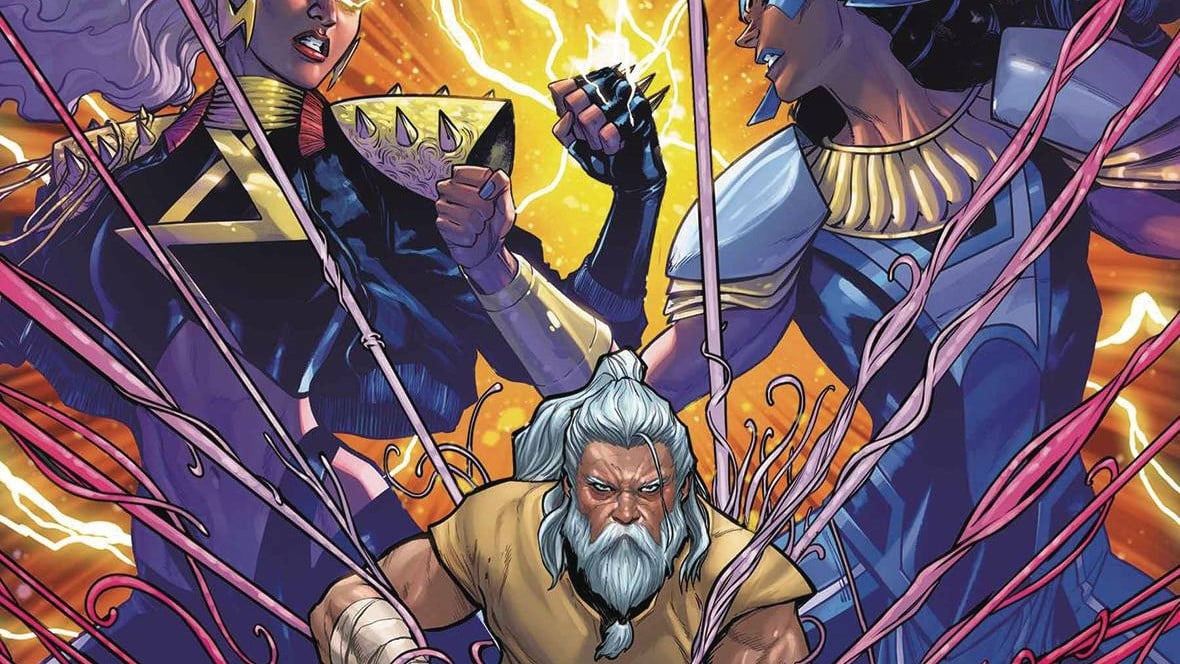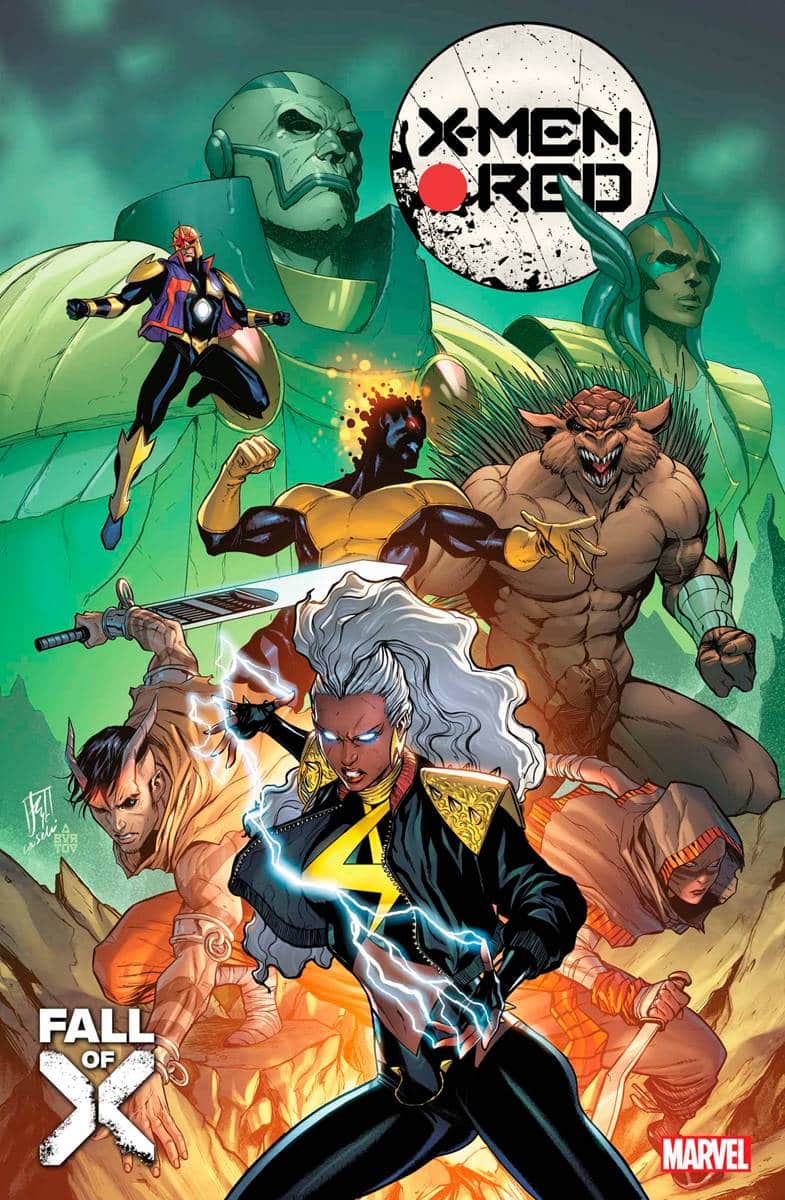How would you describe a perfect day? Perfect — like “good,” like “ok,” like “no good,” like “very bad” — is subjective: an appreciation based on a range of experiences. Perfect, reasonably, might look vastly different among different peoples.
And yet, so many different people hold on to the idea of objective perfection — the idea that there is a day, a song, a movie, a comic book series, at its end — that can earn universal acclaim.
X-Men Red, as a series, was plagued with visuals that often failed to convey the excellence of it’s narratives; narratives that too often contorted to fit within mutant-line-wide phenomena (Eternals, Sinister) in ways that took precious space away from a (thankfully) diverse and (maybe too) grand cast of characters.
And still, despite this, maybe *because* of this, Red was a thoroughly enjoyable ride, filled with surprises and revelations and threats that felt earned, organic, and logical. The work’s central theme — a community of the healed is stronger than any individual’s pride — was explored in ways both intricately thoughtful and comically grandiose.
X-Men Red #18, then, serves as a fitting coda: well-written, with genuinely shocking and satisfying moments, handicapped by mediocre art and a need to do too much up in too little space — a thoughtful end that still feels like it has so much more to say.
Mother vs. Mother
The main conflict is a thourple between the former Regent of Arrako, the goddess Storm, its former and maybe future queen, the Omega Poison Ivy Genesis, and the sentient staff from X of Swords Annihilation, whose whispers bend wills like water rushing against a rock — wearing it down repeatedly until the rock bends to the whims of the water.
There’s also Apocalypse, whose inclusion takes away from the pure ideological battle between the whims of two women — though you can argue he fills the “magic girl” role in a gender reversal. AND! two fighting islands that deserved more than three total panels. Yes, the metaphor of the land fighting itself was better covered with Genesis vs. Storm, but giant fighting islands is peculiarly absurd in the most beautifully comic book of ways.
Also cool: seeing Storm use ice powers. I’ve appreciated how Ewing’s expanded the way she uses her gifts beyond simply wind and lightning. It’s obvious she’s still holding back her full power, preferring to use subterfuge and precision over pure power.
But the power is clearly there.
That said, Genesis disappoints. Her precision usage of microbes to spy and make opponents fall could have been expanded on as opposed to her simply shooting vines. She’s best characterized as a mildly more developed Mecha Moria — obsessed with power and vengeance. Sure, since she represents unbridled pride as the antithesis to Storm’s humility, this makes more narrative sense than the Orchis Cyborg. Still, her characterization as “Apocalypse’s naughty wife” felt better fleshed out and empathetic in X of Swords and Heralds of Apocalypse (the X-Men Red one-shot) than here in the main numbered line. That’s not to say she has to be empathetic; just that the empathy would provide her deeper complexity. A little ambiguity goes a long way in establishing interesting characters, and she feels robbed of it here.
To be fair, both Storm and Genesis could have used more internal monologue in these final moments. But then again, there was a lot of ground to cover and only so many pages to fit it in.
Temptation Island
And of the Staff? Annihilation was a drug — a representation of temptation, of falling to your baser, more brutal desires in pursuit of power. Remember, for Apocalypse to beat Annihilation he had to yield. To beat the drug of power, you have to be willing to give of yourself, even when giving might mean yielding instant gratification. This, more than lightning or knife throwing, is Storm’s power: she denied herself the temptation of queendom (no thornes), of vicious vengeance (no Uranos), and of certain victory with Annihilation.
Yet it’s not entirely clear how much people are aware of Annihilation’s influence — or how strong that influence is. It is unclear if the power is merely a suggestion that feels like it’s one’s own, or something deeper that compels action. The *miss* adage feels purposefully passive: “strike yourself with lightning and die” would be more direct and effective, but that kind of direct action is never asked. Is this because Annihilation lacks power, or because power is always limited — and ultimately controlled by the will of the user? That Storm was able to weaponize these “suggestions” against Annihilation implies a lack of omnipotence on the staff’s part, and an awareness of its voice on Storm’s.
And maybe that’s the point? Maybe that fact that mere suggestions were able to bring a people to its knees was a treatise on how small things matter. In this sense, it serves as a mirrored opposite to the Night Seats — low on “power”, high on influence.
The theme of “no thornes,” then, is played to its logical conclusion as, in her final temptation, she rejects the idea of using the staff to lead to a win. She believes in people — even when it’s inconvenient, even when it’s maybe unwise, but almost always certainly necessary. Again, this is her power. (Also powerful — the black and white splash/data page, where Annihilation fails to tempt Storm. These digressions are more masterful and effective than any banal lightning strike.)
Which is why the means in which she defeated Annihilation felt rote. She defeated the omega shape shifter in issue one by lightning (whether it was her lightning or the shape shifter’s was unclear); she melted the Uranos Trigger with lightning; the use of lightning here to melt the staff, while thematically unifying, feels regressive for a character who used her powers in such a wide variety of ways *in this series.*
Regardless, the staff is gone, the war is over, and Genesis mourns the loss of a voice in her head —another reminder of addiction. She was no less powerful without the staff, no more powerful with it, and yet she broke when the staff melted.
Tight Ends and Loose Ends
The side story of Jon Ironfire, the emotional surrogate to the Arakki people, was settled, as he used mercy (by Storm’s example) instead of vengeful spite. His story felt a bit inconsequential — a new character introduced and likely exited — compared to the fates of more interesting and better developed characters:
- Isca is very conspicuously absent, choosing not to pick a side. As we understand, she has no control over her powers: is her benevolence a choice and character growth, or is it a means of picking a side that’s not yet entered the board?
- Nova is still infected with Pestilence’s arrow. Why hasn’t Death healed him? What’s his next move?
- Where is Gabriel? He only had a cameo in one panel, and one would think an angry Omega level mutant who can break planets might have use breaking, I don’t know, a death satellite orbiting the sun.
- Jon and the Fisher King may be emotional surrogates, but the culture of the Arakki still feels unexplored beyond the council. In many ways, Arakko felt (feels) like an outdated extension of Reservations for First Peoples: placing once proud people on far away lands as punishment for being inconvenient, under the guise of independence. For who is Storm but a more benevolent colonizer, intersecting her well-intentioned beliefs to a people who already have a religion?
- To Ewing’s credit, Storm struggled with how to best integrate and acquiesce herself to the people. Still, Red can read much like “White Man’s Burden” led by a Black Mutant; there was a place for a more coherent voice of opposition to her presence than snide remarks by Genesis (who, I also argue, would have made a more compelling villain if she were given some of the complexity given to her sister) or Brand.
- Speaking of, where the hell is Abigail Brand?
For all it’s “A-List” talent, X-Men Red is arguably the story of the Fisher King: the unseen, the scavenger in the shadows, who gave his life to give history a new perch atop the all seeing and judging eye of the land. The unseen yields sight; the unknown yields memory. Poetic justice, indeed.
And of poetic justice: X-Men Red #18 ends as X-Men Red #1 began, with a scrappy rebel, surrounded by loyal acolytes, planning their assault. Here, we see Genesis, exiled from her people, her husband, two children (one dead, one a living embodiment of death who deserted her) sitting on a throne of corpses. They’ve invaded the Orchis Phobos base, apparently killing all its (fascist!) human inhabitants quickly and easily, solving two problems (isolating Genesis and taking out possible invaders) with one move. Her last statement (who deserves the sword aimed at them more than the humans they’ve just killed? “The Brotherhood does”) works on several levels. It’s word for word (for word) what Storm said at the end of the first issue, as she assembled the Brotherhood to defend Arakko; it places the blame for her fall from grace on the actions of others as opposed to herself, showing that she’s refused to reflect and take accountability for any damage her deeds caused; and, of course, it foreshadows further confrontation, both with the leadership who excommunicated her and with the rank and file mutants, both from Arakko and Earth, who have not returned to her beck and call. She is curt and coiled, like a viper in waiting.
But who knows if we’ll ever see her strike.
At Comics XF, we don’t rate comics by a number scale. We think this is reductive; that works deserve more than arbitrary number grades, that readers are best served by reading nuanced statements than searching for immediate validation found in a number ranking.
And yet, if I say this is good, or great, or perfect even — is that not a ranking? Is that not the same validation, just in a more elongated form?
How then, you might ask, can I review a comic if i don’t want to tell you if it’s good or not?
Easily, actually.
Would I recommend this series to someone new to comics? Absolutely not. While the story is relatively clear and focused, it absolutely requires more than a working knowledge of the Krakoan era, of Ewing’s cosmic work with guardians, of tie-ins about the Eternals and Mr. Sinister — names unlikely to be familiar to those just getting into the genre. This is not beginner material.
Would I recommend this to someone who was an art lover? Yes and no; while I riff on the banality of some of the illustration, I also argue this series has included some of the best, most profound images of the era: Magneto, emerging from ashes, holding his heart together with electricity; Magneto, leaving this plane for another (that we’ll visit soon!), Storm, using the Red Triangle Protocol in a two page spread that impressively merged a menagerie of classic comic panels into a new, beautiful whole; there was some truly great stuff here (not to mention impressive skin tone coloration), but still, in comparison to some other fare, it all still feels a bit pedestrian. Maybe that’s unfair, but it is honest.
Would I recommend this to the assholes who think woke is a slur and pine for the days where blond women’s breasts bulged and their feet were unseen? Without reservation. The writing, the pacing, the thought and intention here, while certainly not perfect (see above re: colonization analogy), was still great, lightyears beyond much of the work those folk laud. This world was not worse off by being led by analogues for First Peoples and Africans; it was not less interesting for not relying on casual sexuality to define it’s female characters; or for leaning into implicit and explicit queer inferences in panels. Inclusivity does not water down work; it strengthens it, makes it more relatable and forms a basis for better, closer to perfect works to arise.
And of perfection, of that perfect day: recognition of perfection requires experiencing many imperfections. We can’t know if a day is just right unless we’ve experienced too hot or too cold; too windy or too dull; too wet or too arid. Without a means of comparison, a perfect day would only be a day; a perfect comic would be the expectation, not exception.
As an avid X-Men reader of the Krakoan era, I’ve experienced my fair share of cloudy days. X-Men Red has been consistently exceptional, even among some of the most exceptional comics of the generation. And while it might not be for everyone, and while it’s certainly not perfect, it, along with Immortal X-Men and Sabretooth, best explored both the promises and shortcomings of Krakoa — and of comics as a whole.
And while I’m sad the sun is setting on X-Men Red, I’m hopeful that from its ashes, more exceptional days — and comics — lie ahead.
Disclaimer: As an Amazon Associate, ComicsXF may earn from qualifying purchases.
A proud New Orleanian living in the District of Columbia, Jude Jones is a professional thinker, amateur photographer, burgeoning runner and lover of Black culture, love and life. Magneto and Cyclops (and Killmonger) were right. Learn more about Jude at SaintJudeJones.com.

